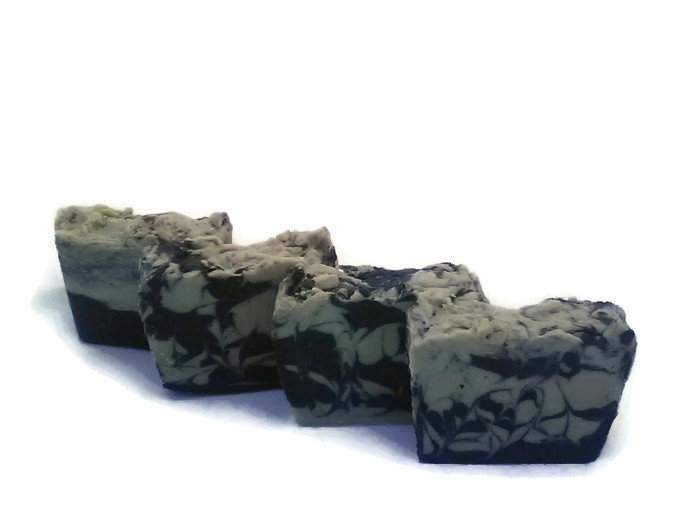If you like Natural Soap, You see them everywhere. Are they the same? African Black Soap (ABS) and Activated Charcoal Soap. I mean Activated Charcoal Soap is Black. African Black Soap is not. Are they the same soap? Are they used the same? African Black Soap vs. Activated Charcoal Soap. What’s the Difference?
Hopefully by the end of this post. I will have answered a few of your questions.
What is African Black Soap?
African Black Soap, also known as Alata Samina, is an all-natural soap that originated in Nigeria and is also made in Ghana. The process used to make it is very similar to hot process soapmaking in that there is an external heating element used to help the process along. Usually a large pot over an open heat source. Traditionally, Alata Samina was made by women and truly authentic ABS still is to this day.
The ingredients used during the creation of ABS are traditionally Plantains, Shea Tree Bark, Palm Tree Leaves, and Cocoa Pods. Locally harvested, sun-dried, ground, and then burned to produce the ash used in the soap. Next, they are combined with water and oils, like Coconut, Palm Kernal, or Shea. Cooked down through the soapmaking process, then cured.
Your most genuine ABS does not contain scents, nor coloring. It is brownish in color and amazing as created. So good, you really don’t need anything else.
Sounds amazing, right? Well, it is. As a matter of fact, you might feel inclined to look for ABS on our site. It’s not there. Allow me to give you a few reasons why. When I first learned about Alata Samina, I was taught that making it was historically ceremonial. In addition, true Alata Samina is no walk in the park to make. Bro. Wode Maya has an amazing YouTube video showcasing the process of making Alata Samina. This soap is also a huge source of income for the women who make it. For those reasons, I refrain from creating a version of a soap that is so wonderful on its own. If I were to offer it, I would definitely source it so that I am positively supporting those who create the real deal. Also ensuring that I continue to provide you with the best products available.
What is an Activated Charcoal Soap?
In the last few years, Activated Charcoal has appeared in just about everything on the planet. From scrubs to Lemonade, Air Filters, and even Soap. But what is it?
Activated Charcoal used in soap is soot that has been treated to be more sponge-like and absorbent. Activated Charcoal isn’t that the same charcoal that you use on the grill? Hmm, not so much. I have an article, that provides a breakdown of the difference between the two.
Activated Charcoal (Carbon), is a substance created from Coconut Shells, Peat, Petroleum Coke, Coal, Olive Pits, and Sawdust. It undergoes an additional process than charcoal that adds oxygen thus increasing its porosity and surface area.
When used in soaps it allows for a really deep and pulling cleanse. Which makes it a great ingredient for most skin types. Unlike Traditional Alita Samina, Activated Charcoal Soap is often combined with other ingredients and scents. We have a few Activated Charcoal Soaps at Hazel’s Soapery.
Hazel’s Soapery Activated Charcoal Soaps
Unlike Alita Samina, ABS. We have a few soaps with Activated Charcoal
Be Still is one of our most popular. Activated Charcoal, Bentonite Clay, and Tea Tree Oil. This makes a super cleansing bar that teens and those with Oily skin love.
Next, Divine is far less pulling. Perfect as a facial bar because the Activated Charcoal is mellowed out by the use of Lavender Essential Oil. An absolute favorite of those with Mature and or Normal to Dry Skin. Plus, who doesn’t love Lavender?
Finally, we offer Nyrvana, in this bar we combined Activated Charcoal with Moringa. Moringa is known as the Miracle Tree, helps attract moisture to your skin.



I used these as examples to showcase the versatility Activated Charcoal has when combined with other ingredients.
Comparing Alata Samina African Black Soap vs Activated Charcoal Soap. What’s the difference?
Now that we know. what they are and how they are created. Let’s talk about, What’s the difference?
Their appearance, some of the ingredients used to make them, Where they originate from and how they are created.
However, what remains the same is that both of these soaps are wonderful cleansers for most skin types.
Alata Samina has been around for centuries and you can use it from head to toe. A 2018 study on African Black Soap by the African Journal of Biotechnology found that “screenings of black soap revealed it contains some secondary metabolites which are nourishing to the skin. This is a good justification for the reason it cleanses deeply and nourishes all skin types”.
Activated Charcoal has also been around for a long time. Often used for its medicinal properties which is why we see it in so many products like toothpaste, deodorants, and capsules for stomach issues. However, you know I talk soap, not medicine. For skin, it is great at helping to pull excess oil and dirt from your skin. It can feel tight afterwards, but nothing a great moisturizer or toner can’t fix. Just like African Black soap, it is usually great on most skin types.
Both soaps are great deep cleansers, if I had to pick one over the other, it would definitely be a hard choice. However, I hope this information can serve as a guide to help you with your decision-making. When in doubt, try them all! Just not at the same time!
Have a great day and leave a comment below with questions or to let me know what you think of the article.
Remember,
You Deserve A Little Self-Care Every Day!
Camille











